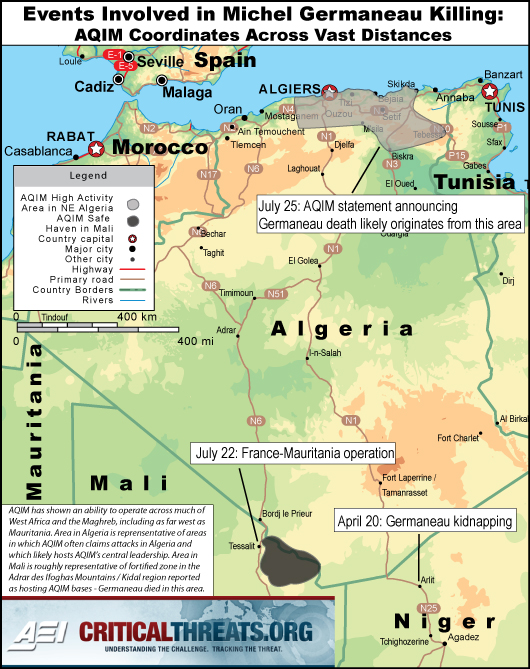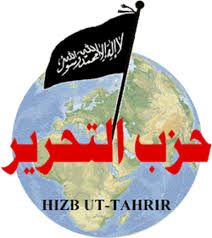NOTE: al-Qā’idah in the Islamic Maghreb (AQIM) is based in Algeria, but also conducts activities in other countries such as Mali, Mauritania and Morocco. Here is an excellent map recently produced by AEI’s Critical Threats Project, which shows AQIM’s recent activities and its main safe havens:

—

Category: Uncategorized
Al-Andalus Media presents a new video from al-Qā’idah in the Islamic Maghreb: "The expedition of Al-Mansura"
NOTE: al-Qā’idah in the Islamic Maghreb (AQIM), based in Algeria, but conducts activities in other countries such as Mali, Mauritania and Morocco, has released a new propaganda video, which according to AbuMandM, who has watched the video already, alledges that AQIM has infiltrated the Algerian security services.
—

Kavkaz Center releases new video message from Dokku Umarov, Emir of the Caucasus Emirate and his Deputy Sufyan
Al-Katāayb Foundation for Media Productions presents: "The African Crusaders"
NOTE: Al-Katāayb Foundation for Media Productions is the media center used by al-Qā’idah-linked Ḥarakat al-Shabāb al-Mujāhidīn based in Somalia. Ibn Siqilli on this video:
Harakat al-Shabab’s media outlet, the Al-Kata’ib (Brigades) Media Foundation, released a video entitled “The African Crusaders” yesterday in which the AU’s forces are labeled agents of the United States, which seeks to persecute Muslims in Somalia and across the globe. Battle footage shows fierce fighting between Harakat al-Shabab militiamen and AU forces, particularly Uganda Army soldiers. Ugandan “crusaders” were discussed in Harakat al-Shabab’s groundbreaking September 2009 video “Labbayk Ya Usama” (We Heed Your Call, O’ Usama), which I wrote about at some length HERE.
Citizens of the African nations contributing soldiers to the AU mission in Somalia, namely Uganda and Burundi, are asked to consider whether they wish to sacrifice their sons to a failed mission in Somalia to support a weak, failing government, that led by PresidentShaykh Sharif Ahmed. The video’s narrator asks Ugandans to consider whether their soldiers would have been better employed defending them from the insurgents of the Lord’s Resistance Army led by Joseph Kony in northern Uganda.
In one part, audio of the late Harakat al-Shabab leader Aden (Adan, Adam) Hashi Ayro (he was killed in a U.S. missile strike in March 2008) is used and a current commander, Husayn Fidow, is shown speaking. The group also recently released photographs of its fighters burning captured AU vehicles.
—


Scratching the Surface of Radicalism in Germany
NOTE: This article was originally published at The Washington Note and is being cross-posted here with permission from the author, Andrew Lebovich.
—
On Monday Germany’s domestic intelligence agency, the Federal Office for the Protection of the Constitution, announced the launch of a new counter-terrorism initiative, a hotline for members of radical Islamists groups to call where they can get advice for leaving the group. The idea, based on long-running programs for Germans leaving neo-Nazi groups, has gotten relatively favorable coverage from wire services and news sites. German Interior Minister Thomas de Maizière described it as a “valuable preventive effort” in helping counteract the threat of domestic radicalization.
For the last few years German officials have expressed increasing concerns about radicalization, first of German Muslims from immigrant backgrounds and more recently from German converts to Islam. Germany reportedly monitors 29 different Islamist organizations, and estimates that roughly 36,000 members of these organizations pose potential security risks. The 2007 Sauerland cell arrests raised the specter of terrorism against German and American targets, and more recently anecdotal evidence suggests a small but steady flow of young Muslims and converts (estimated to be about 40 per year) to conflict zones such as the Afghanistan-Pakistan border region. The death of wanted militant Eric Breininger and the publication of his jihadist memoirs/travelogue soon after shone a spotlight on this phenomenon, and brought new attention to the persistent rumors of a “German colony” of jihadists in Pakistan.
Religious and potentially violent extremism is thus a clear problem in Germany, as in other European countries, but a jihadist recovery hotline hardly qualifies as de-radicalization. And while not a bad idea at all, this idea is neither preventive nor likely to be particularly effective.
On the one hand, many factors have to converge for someone to even use this hotline; an individual, having joined a radical organization, would have to have come to the decision not only to leave an organization with likely tight-knit members, but also overcome the very real fear of retribution as well as accept the possible arrest of friends and associates in the group as a result of their return from an extremist environment. This is a small group of people, though by all means governments should provide them the support they can.
Yet the real problem lies not in getting through the social and security pressures placed on militant group members, but letting the process radicalization get that far in the first place. In a 2009 report the Muslim Public Affairs Council attempted to lay out the complex and ill-understood manner in which an individual progresses from a so-called “normal” life, to possessing radical ideas, and perhaps to action. The report lays out a variety of factors (economic, political, social/cultural and personal) as well as steps that generally occur as someone grows more radical.
While radicalization is different for each person, the report helps demonstrate that a long process precedes the act of joining an activist or militant group, whether the seeds for this progression are sown in a mosque, amongst a circle of friends, or on the internet. Waiting for someone to join, lose taste for, and summon the courage to leave a militant organization is not preventive, it is reactive. And it means that for every person who goes through all of these steps, many more undergo radicalization unabated.
I do not doubt that German officials understand the threat posed by radicalization. And thankfully the threat from domestic terrorism, whether in Europe or the United States, remains low. But the fight against terrorism requires continuous effort to understand and treat the causes of radicalization, rather than dealing with symptoms as they appear.
Andrew Lebovich is a Research Associate for the American Strategy Program at the New America Foundation. He writes the weekly column “The Legal War on Terror” for Foreign Policy and blogs at The Washington Note. You can follow him on twitter at twitter.com/tweetsintheme.
Jamā’at Anṣār al-Sunnah release their first propaganda video: "The Knight of Ansar #1"
UPDATE: IbnSiqilli has clarified the similarities between the two Jamā’at Anṣār al-Sunnah in Gaza and Iraq. The Iraqi groups’ members are mostly Kurds, therefore it seems unlikely that Palestinians have been part of their group. Rather, it is just a popular name.
NOTE: Jamā’at Anṣār al-Sunnah is an al-Qā’idah-linked group based in the Gaza Strip. It is speculation on this authors behalf, but there is a group in Iraq that has the same name, therefore it is possible that Jama’at Ansar al-Sunnah in Gaza is a faction of past Palestinian foreign fighters in Iraq. Jama’at Ansar al-Sunnah in Gaza also claimed responsibility a for rocket attack this past March, which landed in Israel, killing a Thai worker. The attack in response for the so-called “Judaization” of sites both holy to Jews and Muslims.
—

Ḥizb ut-Taḥrīr posts invitation and trailer for its upcoming International Media conference in Beirut
NOTE: Ḥizb ut-Taḥrīr (The Party of Liberation) is a Sunni pan-Islamist movement whose goal is to unite the Muslim ummah (community) and reinstate the Caliphate (al-khilāfah). Once the Caliphate is reinstated, the government would be ruled by Islamic law (sharī’ah) with the Caliph (khalīfah) being the head of state elected by a shūrā (consultation) council. Ḥizb ut-Taḥrīr was founded in 1953 in Jerusalem by Taqī ad-Dīn al-Nabhānī who was an Islamic scholar (‘ālim). Currently, Ḥizb ut-Taḥrīr is located in more than forty countries and is especially active in the United Kingdom and maintains a branch in the United States. The invitation is unedited below and the trailer for it is embedded under the invitation.
—
بِسْمِ اللّهِ الرَّحْمَنِ الرَّحِيمِ
International Media conference
Hizb ut-Tahrir’s Perspective on the world’s most critical international and regional problems
The Central Media Office of Hizb-ut-Tahrir is honored to invite you to participate in the international conference to be held in Beirut-Lebanon to mark the 89th annual painful remembrance day of the destruction of the Khilafah on the 28th Rajab 1342H/ 3rd March 1924.
The conference will be convened under the title:
Hizb ut-Tahrir’s Perspective on the world’s most critical international and regional problems
The speakers will present the viewpoint of Hizb ut-Tahrir related to the most significant strategic crises confronting the global village:
A- The Muslim world:
•1- Issues in the Middle East (Palestine, Iraq, Sudan)
•2- Issues in South Asia (Pakistan, Afghanistan)
•3- Issues in South East Asia (Indonesia and the separatist movement)
•4- Issues in West and Central Asia (Cyprus, Turkey, Caucasia, East Turkestan)
B- Islam, Muslims and the West
C- International crises that impact the Muslim ummah:
•1- The international financial crisis
•2- The global nuclear threat, including the Iranian nuclear issue
All these issues will be addressed in an express unambiguous manner presenting the true path to better future for the troubled global village
Professional politicians and distinguished media people can not afford to miss this opportunity.
Date : Sunday, 6 Shaban 1431 H, corresponding to July 18, 2010
Conference venue: Conference Hall of Bristol, Le Bristol Hotel Convention Center, Verdun, Beirut
Osman Bakhach
Director
Central Media Office
As-Saḥāb releases video message by Usāmah Bin Lāden addressed to the American people
NOTE: As-Saḥāb (“The Clouds”) Foundation for Islamic Media Publication officially released a video message of Usāmah Bin Lāden speaking to the American people. It was first aired on al-Jazeera TV back in March. The main highlights of the video include:
“My message is about the captives that you have taken from us. Your friend in the White House [President Barack Obama] has been following the footsteps of his predecessor [President George W. Bush] in many important issues, such as escalating the war in Afghanistan and unjustly treating our people that you took as captives.”
Bin Laden threatened to murder anyone they captured if the United States kills Khāled Shaykh Moḥammed.
—

Ḥizb ut-Taḥrīr releases a trailer video for its upcoming conference in Australia titled "The Struggle for Islam in the West"
NOTE: Ḥizb ut-Taḥrīr (The Party of Liberation) is a Sunni pan-Islamist movement whose goal is to unite the Muslim ummah (community) and reinstate the Caliphate (al-khilāfah). Once the Caliphate is reinstated, the government would be ruled by Islamic law (sharī’ah) with the Caliph (khalīfah) being the head of state elected by a shūrā (consultation) council. Ḥizb ut-Taḥrīr was founded in 1953 in Jerusalem by Taqī ad-Dīn al-Nabhānī who was an Islamic scholar (‘ālim). Currently, Ḥizb ut-Taḥrīr is located in more than forty countries and is especially active in the United Kingdom and maintains a branch in the United States.
—

Al-Katāi’b Media releases new video statement: "Message to the French People From the Imprisoned Security Adviser Denis Allex"
NOTE: Yesterday, Al-Katāi’b Media released a video message where a French security advisor Denis Allex pleads to French citizens and his government to release him. He is currently held by al-Qā’idah ally Ḥarakat al-Shabāb al-Mujāhidīn. Also, Allex appears to be wearing a prison jumpsuit. Could one argue that this is a veiled message about Guantanamo Bay? The entire video is embedded below. For more on the statement see the full AFP story:
The Frenchman cited the demands of his captors, Somalia’s Al-Qaeda-inspired Shebab rebels, which include the immediate end to any political and military support from France for the Somali government and the withdrawal of all foreign advisors and private security firms in Somalia.
—


